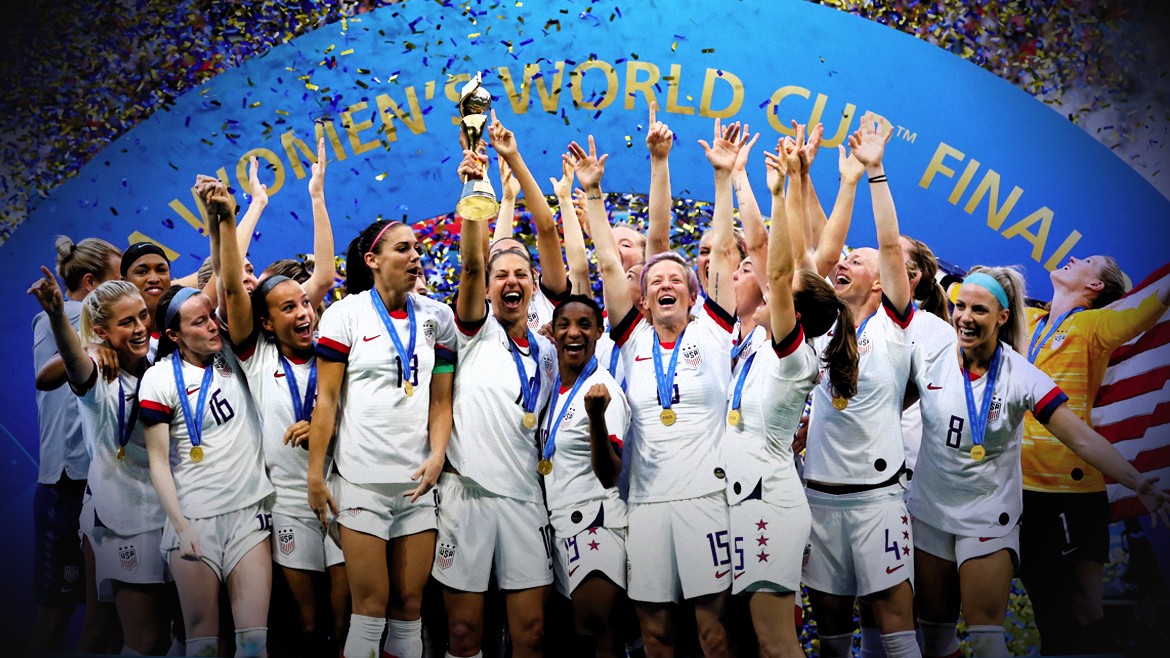The 360 is a feature designed to show you diverse perspectives on the day’s top stories.
Speed read
What’s happening: As the U.S. Women’s National Soccer Team celebrated winning their second-straight World Cup with a 2-0 victory over the Netherlands, many members of the crowd in the arena in Lyon, France, began chanting “Equal pay. Equal pay. Equal pay.”
The chant was inspired by a long and public campaign by U.S. team members to be paid the same rate as their male counterparts. The team filed a class-action lawsuit against the U.S. Soccer Federation in March. At times, members of the men’s team earned more for losing than the women earn for winning.
U.S. team co-captain Megan Rapinoe — who sparked debate with her emphatic refusal to visit the White House after the tournament — said the pay gap is “certainly not fair.”
While the pay disparity from the USSF is significant, there’s an even bigger chasm when it comes to bonuses for performance in the World Cup, which are doled out by soccer’s international governing body FIFA. The U.S. women were awarded a $4 million bonus for winning this year’s tournament. France was given $38 million for winning the men’s competition last year.
Why there’s debate: The pay gap between the teams has raised allegations of sexism, especially given how much more successful the women have been on the field. This was their fourth World Cup win. The men have never advanced past the quarterfinals and failed to even qualify for the 2018 tournament. There is also evidence that the women generate as much or more revenue for the USSF than the men do.
Those on the other side of the argument say men are paid more because the men’s game is broadly more popular. While the U.S. teams may be comparable, they say, there is still a massive gap between the interest level and revenue generated between men’s and women’s soccer globally.
What’s next: The women’s game is growing in popularity — the total global audience for the World Cup topped 1 billion — giving the players more leverage to demand pay equity. In response, FIFA’s president has proposed doubling the prize money for the Women’s World Cup and expanding the tournament to 32 teams. Mediation to settle the U.S. women’s lawsuit against the USSF is expected to start sometime soon now that the World Cup is over. Meanwhile, a bill was introduced in the Senate that would halt funding for the 2026 men’s World Cup, which the U.S. will co-host with Canada and Mexico, until the women are awarded equal pay.
Perspectives
The women have to play at an elite level to make as much as men do being mediocre.
“Are the women players paid less? Sometimes. When the female players have appeared to make about the same or more money, they’ve had to turn in consistently outstanding performances on the world stage.” — Meg Kelly, Washington Post
Men’s soccer generates more money, so the players should get more pay.
“The men still pull the World Cup money wagon…The pay disparity is justified.” — Mike Ozanian, Forbes
The women’s game is less popular because it’s been held back by sexism.
“Even though the men’s team has bought in more revenue historically, the men and women haven’t been competing on a level playing field, as the saying goes. One of the reasons that women’s sports have received less attention and brought in less money is the long history of discrimination.” — David Leonhardt, New York Times
The women should get equal pay for equal work.
“So what’s the issue? Fairness and respect. Women and men should be paid the same for equal work. Women’s sports are not a pale imitation of men’s sports. They have value on their own — and so do the women who play them.” — Editorial, Syracuse.com
The U.S. women have advocated for themselves with their words and their play
“But this team and Rapinoe are legends now … because they demanded to be heard on the issues they cared about and then went out and kicked everybody’s ass to boot. They will be more beloved, and richer, and more successful, having spoken out than if they hadn’t.” — Will Leitch, New York magazine
The women have the right to ask for more money than the men.
“For almost 30 years now, the U.S. women have been the best in the world, the team every other country aspires to have. And for more than 20 of those years, the Americans have been fighting their own federation for equal treatment. Not treatment befitting their rank in soccer and how it compares with the men’s team, mind you. Or treatment that reflects their drawing power. Just plain and simple equality. As in, we do the same job, we should get the same money.” — Nancy Armour, USA Today
Men earn more because their sports are more exciting.
“People don’t want to hear this, but the women’s teams are simply not nearly as good as all-male teams. They can be exciting, and rooting for them is equally patriotic, but the market has spoken quite loudly on this topic … as have the rare high-level competitions between men and women.” — Brad Polumbo, Washington Examiner
Claims that the women’s game is less profitable are unproven.
“And, while [the] men’s World Cup is much more established and commercially successful than its women’s counterpart at this point in time, the truth is, since FIFA bundles so many of the lucrative broadcast rights and sponsorship agreements for the two events together in one neat package, it’s very hard to tell how much, exactly, the women’s event is capable of bringing in on its own.” — Lindsay Gibbs, ThinkProgress
The women are more successful, they should get more money than the men.
“The superb athletes of the U.S. women’s national soccer team, once again winners of the World Cup, shouldn’t be paid as much as their counterparts on the men’s team. The women should be paid more. A lot more.” — Eugene Robinson, Washington Post


